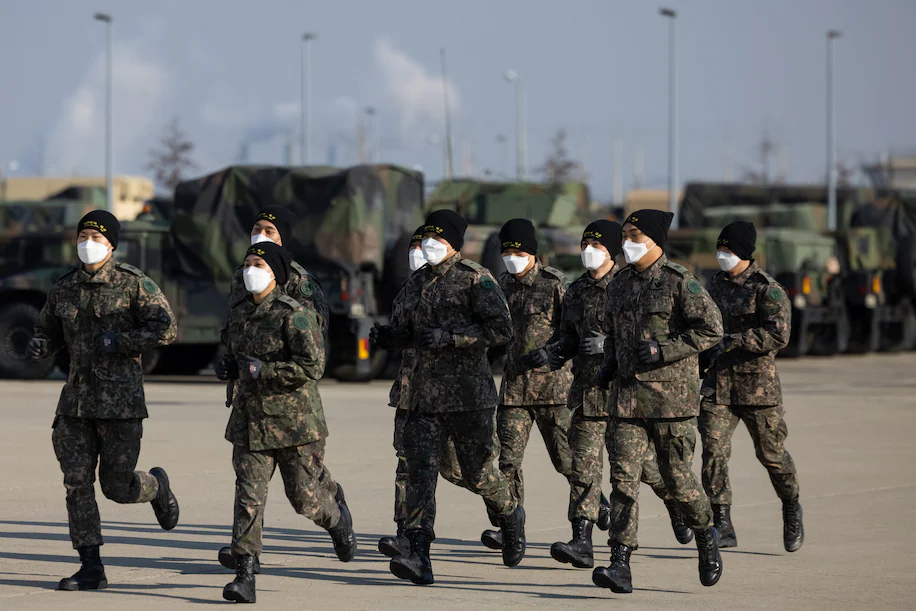
South Koreans overwhelmingly want nuclear weapons to confront China and North Korea, poll finds
Yesterday at 8:00 p.m. EST
TOKYO — There has long been a desire among South Koreans for domestic nuclear weapons capability, but a poll shows that in the face of North Korea’s nuclear ambitions and an assertive China, that view has ballooned to more than 70 percent of the population — most of whom want to go nuclear even when the potential drawbacks are explained.
The poll, released Tuesday by the Chicago Council on Global Affairs, found robust support for nuclear weapons in South Korea: South Koreans want nuclear weapons even when they feel confident about the country’s alliance with the United States and about the strength of their own military. And those who support nuclear weapons now see a level of prestige associated with them.
South Korea is preparing to elect a new president on March 9 in a neck-and-neck race, and the debate over nuclear armament was reignited during the fall primary among conservative candidates as a potential party platform idea. The poll shows that domestic support for nuclear weapons is squarely in the mainstream view — and that the incoming president may need to contend with it.
Throughout much of the Cold War, the United States had stationed nuclear-armed weapons in South Korea. Then, in 1991, President George H.W. Bush initiated the withdrawal of all tactical nuclear weapons deployed abroad. South Korea remains under the protection of the U.S. nuclear umbrella, which guarantees that the United States would use its nuclear weapons to protect South Korea if needed.
The return of tactical nuclear armament has seemed out of reach for many years, but the debate has cropped up repeatedly. In 2016, then-South Korean President Park Geun-hye reportedly asked the United States to redeploy the tactical weapons but was denied. Currently, South Korea has ambitions for a nuclear-powered submarine.
The poll found that 71 percent of South Koreans supported nuclear weapons — slightly higher than in previous findings. Researchers sought to dig deeper to understand how intensely South Koreans feel about their support and found it has considerable staying power.
For example, when asked to choose between a domestic nuclear weapons program and the stationing of U.S. nuclear weapons in South Korea, similar to that of the past, the public overwhelmingly preferred an independent arsenal, underscoring the desire among South Koreans for greater autonomy over how and when nuclear weapons would be deployed on their behalf.
Researchers also found that, contrary to conventional thinking among security analysts, South Koreans’ support for nuclear weapons remained strong even when they felt confident in the U.S. alliance.
Experts say the findings suggest that U.S. policymakers need to have a deeper understanding of South Koreans’ views.
“We can’t just ignore this. We can’t treat it as, ‘the public is emotional on these issues,’ ” said Toby Dalton, co-director and senior fellow at the Carnegie Endowment’s Nuclear Policy Program and a co-author of the report.
Pronuclear South Koreans saw armament as a way to increase the country’s prestige in the international community. When presented with potential consequences for going nuclear — such as international sanctions or a U.S. troop withdrawal from South Korea — pronuclear respondents largely remained supportive.
“They want to take that next step on the international stage,” said Karl Friedhoff, a fellow in public opinion and Asia policy at the Chicago Council on Global Affairs and a polling expert based in South Korea who co-wrote the report. “The people who support weapons basically support them no matter what.”
South Koreans’ desire for nuclear weapons is often viewed as a way to counter threats from North Korea, a nuclear-armed state that is now working to expand and diversify its arsenal. But the poll found that South Koreans increasingly view China as a long-term threat to the country. They also view Japan as less of a military threat than their two nuclear neighbors.
A majority of South Koreans believe it is unlikely that North Korea will denuclearize, which has also hardened their desire for a nuclear program, said Lami Kim, a co-author of the report and a national security professor at the U.S. Army War College.
“Some may have held out hope during the last diplomatic engagement with the North in 2018 and 2019, but after that failed, most feel their skepticism toward North Korea’s denuclearization has been vindicated,” she said.
S. Paul Choi, principal at the Seoul-based consultancy StratWays Group and a former South Korean military officer who was not involved in the research, warned against reading too much into hypothetical questions about alliance matters and consequences, given the complexities of the issue and the fact that wording choices can make a big difference across polls.
But Choi said a robust debate on the topic is overdue, especially given that a majority of South Koreans have expressed support for a domestic nuclear weapons program for more than a decade.
“South Koreans, the South Korean public, are very aware of the volatile regional security environment in which we live, and the nuclear North Korea threat that we face,” Choi said. “With that understanding, they’re increasingly supportive, or open to, a domestic nuclear program but believe in pursuing that with a strong U.S.-ROK alliance,” he said using the abbreviation for South Korea’s official name.
“For me, as a South Korean, if we didn’t have this debate, that would be worrisome. Given the environment in which we live, we need to examine, review and consider all options and decide which one supports, most effectively, our security interests,” Choi said.
No comments:
Post a Comment